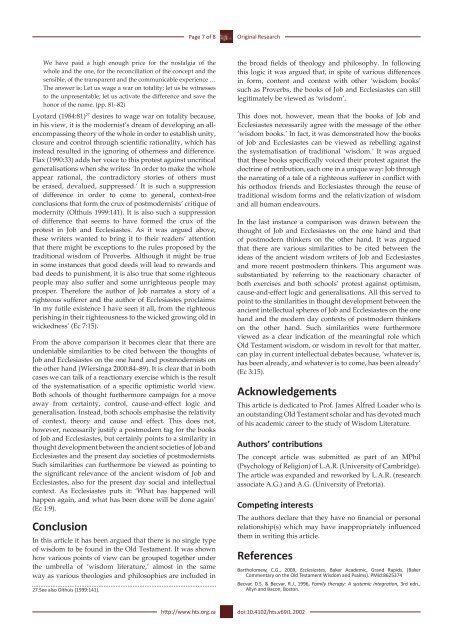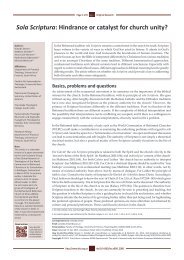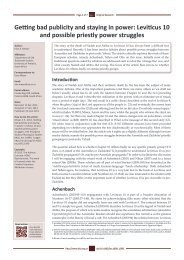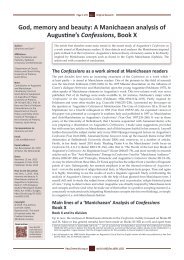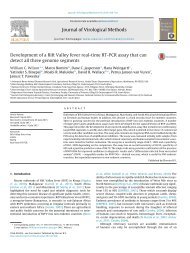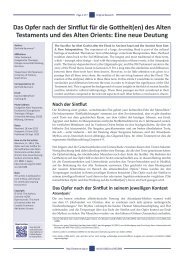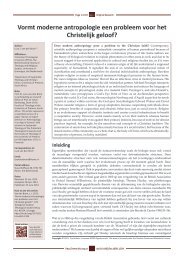Job and Ecclesiastes as (postmodern?) - HTS Teologiese Studies ...
Job and Ecclesiastes as (postmodern?) - HTS Teologiese Studies ...
Job and Ecclesiastes as (postmodern?) - HTS Teologiese Studies ...
Create successful ePaper yourself
Turn your PDF publications into a flip-book with our unique Google optimized e-Paper software.
Page 7 of 8<br />
Original Research<br />
We have paid a high enough price for the nostalgia of the<br />
whole <strong>and</strong> the one, for the reconciliation of the concept <strong>and</strong> the<br />
sensible, of the transparent <strong>and</strong> the communicable experience …<br />
The answer is: Let us wage a war on totality; let us be witnesses<br />
to the unpresentable; let us activate the difference <strong>and</strong> save the<br />
honor of the name. (pp. 81–82)<br />
Lyotard (1984:81) 27 desires to wage war on totality because,<br />
in his view, it is the modernist’s dream of developing an allencomp<strong>as</strong>sing<br />
theory of the whole in order to establish unity,<br />
closure <strong>and</strong> control through scientific rationality, which h<strong>as</strong><br />
instead resulted in the ignoring of otherness <strong>and</strong> difference.<br />
Flax (1990:33) adds her voice to this protest against uncritical<br />
generalisations when she writes: ‘In order to make the whole<br />
appear rational, the contradictory stories of others must<br />
be er<strong>as</strong>ed, devalued, suppressed.’ It is such a suppression<br />
of difference in order to come to general, context-free<br />
conclusions that form the crux of <strong>postmodern</strong>ists’ critique of<br />
modernity (Olthuis 1999:141). It is also such a suppression<br />
of difference that seems to have formed the crux of the<br />
protest in <strong>Job</strong> <strong>and</strong> <strong>Ecclesi<strong>as</strong>tes</strong>. As it w<strong>as</strong> argued above,<br />
these writers wanted to bring it to their readers’ attention<br />
that there might be exceptions to the rules proposed by the<br />
traditional wisdom of Proverbs. Although it might be true<br />
in some instances that good deeds will lead to rewards <strong>and</strong><br />
bad deeds to punishment, it is also true that some righteous<br />
people may also suffer <strong>and</strong> some unrighteous people may<br />
prosper. Therefore the author of <strong>Job</strong> narrates a story of a<br />
righteous sufferer <strong>and</strong> the author of <strong>Ecclesi<strong>as</strong>tes</strong> proclaims:<br />
‘In my futile existence I have seen it all, from the righteous<br />
perishing in their righteousness to the wicked growing old in<br />
wickedness’ (Ec 7:15).<br />
From the above comparison it becomes clear that there are<br />
undeniable similarities to be cited between the thoughts of<br />
<strong>Job</strong> <strong>and</strong> <strong>Ecclesi<strong>as</strong>tes</strong> on the one h<strong>and</strong> <strong>and</strong> <strong>postmodern</strong>ists on<br />
the other h<strong>and</strong> (Wiersinga 2000:84–89). It is clear that in both<br />
c<strong>as</strong>es we can talk of a reactionary exercise which is the result<br />
of the systematisation of a specific optimistic world view.<br />
Both schools of thought furthermore campaign for a move<br />
away from certainty, control, cause-<strong>and</strong>-effect logic <strong>and</strong><br />
generalisation. Instead, both schools emph<strong>as</strong>ise the relativity<br />
of context, theory <strong>and</strong> cause <strong>and</strong> effect. This does not,<br />
however, necessarily justify a <strong>postmodern</strong> tag for the books<br />
of <strong>Job</strong> <strong>and</strong> <strong>Ecclesi<strong>as</strong>tes</strong>, but certainly points to a similarity in<br />
thought development between the ancient societies of <strong>Job</strong> <strong>and</strong><br />
<strong>Ecclesi<strong>as</strong>tes</strong> <strong>and</strong> the present day societies of <strong>postmodern</strong>ists.<br />
Such similarities can furthermore be viewed <strong>as</strong> pointing to<br />
the significant relevance of the ancient wisdom of <strong>Job</strong> <strong>and</strong><br />
<strong>Ecclesi<strong>as</strong>tes</strong>, also for the present day social <strong>and</strong> intellectual<br />
context. As <strong>Ecclesi<strong>as</strong>tes</strong> puts it: ‘What h<strong>as</strong> happened will<br />
happen again, <strong>and</strong> what h<strong>as</strong> been done will be done again’<br />
(Ec 1:9).<br />
Conclusion<br />
In this article it h<strong>as</strong> been argued that there is no single type<br />
of wisdom to be found in the Old Testament. It w<strong>as</strong> shown<br />
how various points of view can be grouped together under<br />
the umbrella of ‘wisdom literature,’ almost in the same<br />
way <strong>as</strong> various theologies <strong>and</strong> philosophies are included in<br />
27.See also Olthuis (1999:141).<br />
the broad fields of theology <strong>and</strong> philosophy. In following<br />
this logic it w<strong>as</strong> argued that, in spite of various differences<br />
in form, content <strong>and</strong> context with other ‘wisdom books’<br />
such <strong>as</strong> Proverbs, the books of <strong>Job</strong> <strong>and</strong> <strong>Ecclesi<strong>as</strong>tes</strong> can still<br />
legitimately be viewed <strong>as</strong> ‘wisdom’.<br />
This does not, however, mean that the books of <strong>Job</strong> <strong>and</strong><br />
<strong>Ecclesi<strong>as</strong>tes</strong> necessarily agree with the message of the other<br />
‘wisdom books.’ In fact, it w<strong>as</strong> demonstrated how the books<br />
of <strong>Job</strong> <strong>and</strong> <strong>Ecclesi<strong>as</strong>tes</strong> can be viewed <strong>as</strong> rebelling against<br />
the systematisation of traditional ‘wisdom.’ It w<strong>as</strong> argued<br />
that these books specifically voiced their protest against the<br />
doctrine of retribution, each one in a unique way: <strong>Job</strong> through<br />
the narrating of a tale of a righteous sufferer in conflict with<br />
his orthodox friends <strong>and</strong> <strong>Ecclesi<strong>as</strong>tes</strong> through the reuse of<br />
traditional wisdom forms <strong>and</strong> the relativization of wisdom<br />
<strong>and</strong> all human endeavours.<br />
In the l<strong>as</strong>t instance a comparison w<strong>as</strong> drawn between the<br />
thought of <strong>Job</strong> <strong>and</strong> <strong>Ecclesi<strong>as</strong>tes</strong> on the one h<strong>and</strong> <strong>and</strong> that<br />
of <strong>postmodern</strong> thinkers on the other h<strong>and</strong>. It w<strong>as</strong> argued<br />
that there are various similarities to be cited between the<br />
ide<strong>as</strong> of the ancient wisdom writers of <strong>Job</strong> <strong>and</strong> <strong>Ecclesi<strong>as</strong>tes</strong><br />
<strong>and</strong> more recent <strong>postmodern</strong> thinkers. This argument w<strong>as</strong><br />
substantiated by referring to the reactionary character of<br />
both exercises <strong>and</strong> both schools’ protest against optimism,<br />
cause-<strong>and</strong>-effect logic <strong>and</strong> generalisations. All this served to<br />
point to the similarities in thought development between the<br />
ancient intellectual spheres of <strong>Job</strong> <strong>and</strong> <strong>Ecclesi<strong>as</strong>tes</strong> on the one<br />
h<strong>and</strong> <strong>and</strong> the modern day contexts of <strong>postmodern</strong> thinkers<br />
on the other h<strong>and</strong>. Such similarities were furthermore<br />
viewed <strong>as</strong> a clear indication of the meaningful role which<br />
Old Testament wisdom, or wisdom in revolt for that matter,<br />
can play in current intellectual debates because, ‘whatever is,<br />
h<strong>as</strong> been already, <strong>and</strong> whatever is to come, h<strong>as</strong> been already’<br />
(Ec 3:15).<br />
Acknowledgements<br />
This article is dedicated to Prof. James Alfred Loader who is<br />
an outst<strong>and</strong>ing Old Testament scholar <strong>and</strong> h<strong>as</strong> devoted much<br />
of his academic career to the study of Wisdom Literature.<br />
Authors’ contributions<br />
The concept article w<strong>as</strong> submitted <strong>as</strong> part of an MPhil<br />
(Psychology of Religion) of L.A.R. (University of Cambridge).<br />
The article w<strong>as</strong> exp<strong>and</strong>ed <strong>and</strong> reworked by L.A.R. (research<br />
<strong>as</strong>sociate A.G.) <strong>and</strong> A.G. (University of Pretoria).<br />
Competing interests<br />
The authors declare that they have no financial or personal<br />
relationship(s) which may have inappropriately influenced<br />
them in writing this article.<br />
References<br />
Bartholomew, C.G., 2009, <strong>Ecclesi<strong>as</strong>tes</strong>, Baker Academic, Gr<strong>and</strong> Rapids. (Baker<br />
Commentary on the Old Testament Wisdom <strong>and</strong> Psalms). PMid:8625374<br />
Becvar, D.S. & Becvar, R.J., 1996, Family therapy: A systemic integration, 3rd edn.,<br />
Allyn <strong>and</strong> Bacon, Boston.<br />
http://www.hts.org.za<br />
doi:10.4102/hts.v69i1.2002


